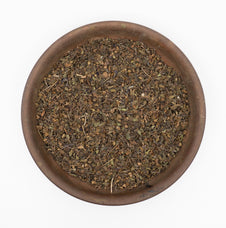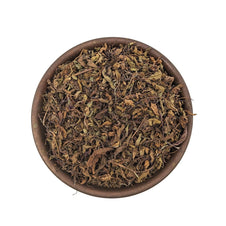





Tulsi Tea
31 reviewsTulsi Tea
31 reviews- In stock, ready to ship
- Inventory on the way
Country of Origin may differ from what is shown above.
Botanical name: Ocimum tenuiflorum
Family: Lamiaceae
Other common names: Holy basil, Tulasi, Vrinda, Queen of herbs, Elixir of Life.
Part used: Aerials
Country of origin: India
Actions: Adaptogenic, antispasmodic, hypotensive
One of the most revered herbs in India, Tulsi (also known as Holy Basil) is planted in the centre of the central courtyard of Hindu houses and temples. It is the herb sacred to the goddess Lakshmi, consort of Vishnu, the god who preserves life. Tulsi tea has a long history of use in Ayurvedic medicine and is a popular adaptogen, helping the body to adapt to environmental, physical and emotional stress.
Uses and preparations
- Considered a tonic herb, Tulsi invigorates and improves vitality. It also promotes a relaxed calm disposition and clear and calm thoughts.
- Tulsi has an affinity with the heart; regular use will help to protect the heart from stress, lower cholesterol and blood pressure.
- Tulsi tea helps to bring relief to respiratory problems such as coughs, colds and flu.
- May help with some types of diabetes because of its ability to stabilise blood sugar levels.
Infusion: Mix 1 tsp to a cup of boiled water cover and steep for 10min the strain. Take 1-3 cups of Tulsi tea daily.
Tincture: Make a 1:5 tincture of tulsi and 45% alcohol
Precautions: No known precautions or contraindications.
All information provided on this website is for informational purposes only. Please seek professional advice before commencing any treatment.








